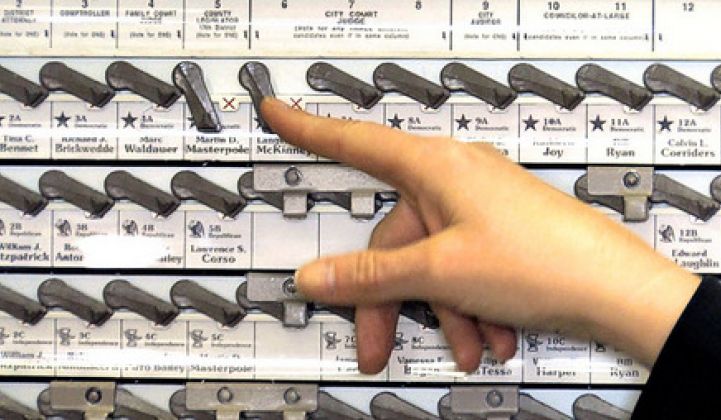On November 6, Californians will cast their votes in a closely watched election. While most of the spotlight will focus on who wins the White House, the future of America’s clean energy future will, to a great extent, be determined by the fate of two ballot initiatives in California, Propositions 30 and 39.
The stakes could not be higher. Today, as a consequence of forward-thinking policies put in place in recent years, California has emerged as the incubator of the nation’s solar industry. Landmark legislation, such as the renewable portfolio standard which requires that 33 percent of the state’s energy come from renewable energy sources by 2020, has helped California lead the nation in clean energy job creation, innovation and investment at a time when our state has needed it most. The California Solar Initiative has helped create almost 200,000 rooftop solar energy systems on schools, homes and businesses around the state and reduce the installed cost of solar energy systems by 50 percent over the past five years. And California’s climate law, AB 32, is now getting under way, helping reduce pollution throughout the state.
But all this momentum could be in jeopardy without the passage of Propositions 30 and 39.
Proposition 39 fixes a corporate tax loophole that encourages corporations to locate employees outside California. By basing corporate taxes on California sales instead of California payroll, Proposition 39 will generate an extra $1.1 billion/year in revenues to California to pay for critical services including education. For the first five years, 50 percent of these new revenues would be dedicated to energy efficiency and clean energy projects on public buildings, helping to put solar panels on schools and creating up to 30,000 new jobs while helping schools lower their energy bills and reinvest that money in the classroom. Endorsed by business organizations like the Silicon Valley Leadership Group, San Francisco Chamber of Commerce and the Los Angeles Business Council, this initiative strengthens our local economy by fixing a loophole that unfairly benefits companies out of state, and uses the resources to invest in California’s future.
Proposition 30 was put on the ballot by Governor Brown to address California’s pressing deficits with a temporary 1/4-cent sales tax increase and personal income tax increase for the Californians earning over $250,000 per year. The majority of the funds generated under this measure would be devoted toward saving public education, the foundation for the future of innovation in California.
If it were to fail, the consequences for the growth of solar and other California renewable energy industries would be severe. There is simply no way California can compete internationally as a clean energy innovator if we let our public education system wither on the vine. Skyrocketing tuition and declining resources will make it harder for California to attract the best and the brightest students who will be the innovators of tomorrow. But if we succeed in passing Proposition 30, it creates a stable platform for new growth, and offers California a better chance to compete with countries like China, that have been investing billions in their renewable energy industry.
The choice facing Californians is clear.
We can continue to lead the nation forward toward a clean energy future or we can cede that leadership to other countries. Fortunately for us, the choice is ours to make on November 6. Vote yes on Propositions 30 and 39.
***
David Hochschild has worked in the solar energy field in California for 12 years. He is co-founder of the solar advocacy organization Vote Solar (www.votesolar.org) and currently serves as Vice President at Solaria (www.solaria.com), a California-based solar panel manufacturer.



